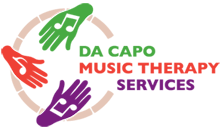This specific music therapy method emphasises the ‘meeting’ with music and other people. The central aim of social music therapy is the improvement or development of social competency, increasing the person’s social understanding, skills and functioning. The focus is on forming relationships and interacting with others in a socially appropriate way. If people are limited within their relationships and social skills, relating to others can become a challenge and foster social illness. During social music therapy the person experience a fun way to re-learn and attain skills for communicating, contacting, relating and interacting with others’, developing the right level of closeness and distance towards others.
Benefits:
- Enhancing the Person’s Social Competency
- Developing & Improving Social Skills and Social Functioning
- Fostering & Promoting Communication & Expression Skills
- Increasing the Person’s Self-awareness
- Learning Coping Strategies for Communicating, Relating, Cooperating & Interacting with Others
- Raising & Improving Social Understanding
Social music therapy is a group music therapy program, predominantly applying music-making activities such as improvising music, dancing, singing, writing songs and musical role play. The music therapist supports the individuals in a safe group setting to change and learn new behavioural techniques in order to improve their social skills and functioning. Participants receive the opportunity to share their social experiences and challenges within their peer group. The tailored music therapeutic interventions will support the individuals to explore and learn how they affect others, improve social and cooperation skills, such as turn-taking, leading and following, compromising, conflict resolution, discover personal stressors and strengths, and learn self-management strategies. Constructive feedback will be given to the participants regarding to their behavioural challenges and misperceptions.
Typically, the sessions are offered weekly for 45 minutes, and accommodated by one trained music therapist, with a maximum of 8 participants. This program is well suited for children as well as adults.

